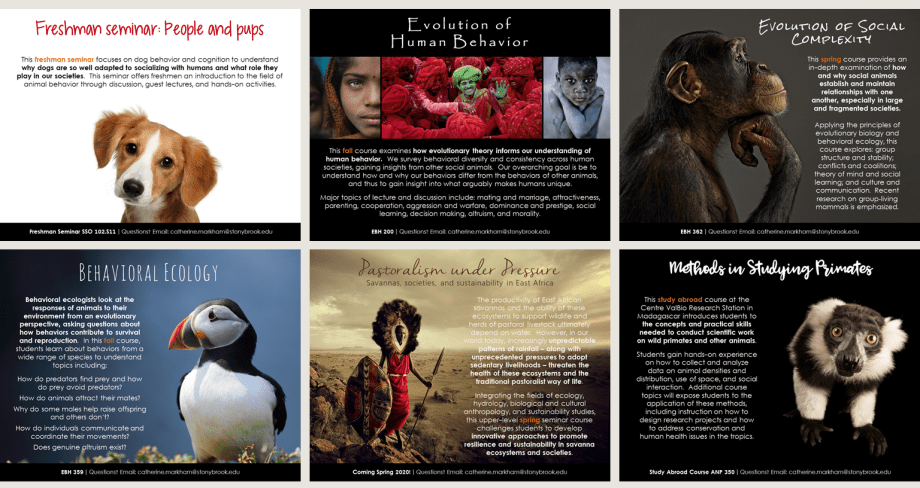Click on the title of lecture and seminar courses for a copy of the syllabus from a recent offering.
Evolution of Human Behavior (EBH 200; 3 credits)
An introduction to how evolutionary theory informs our understanding of human behavior. Our overarching goal will be to understand how and why our behaviors differ from other animals, and thus to gain insight into what arguably makes humans unique. Major topics include: group living and mating/marriage systems; raising offspring and the human lifespan; competition and aggression; cooperation and altruism; decision making; and norms and institutions. Offered in person and online.
Behavioral Ecology (EBH 359; 3 credits)
A consideration of the patterns of animal behavior in relation to ecological circumstances and evolutionary history. Vertebrate examples are emphasized. Offered in person.
Evolution of Social Complexity (EBH 362; 3 credits)
An in-depth examination of how and why social animals establish and maintain relationships with one another, especially in large and fragmented societies. Applying the principles of evolutionary biology and behavioral ecology, this course explores: group structure and stability; conflicts and coalitions; theory of mind and social learning; and culture and communication. Recent research on group-living mammals, particularly non-human primates and human populations, is emphasized. Offered in person.
Pastoralism Under Pressure: Savannas, Societies, and Sustainability in East Africa (ANT 408; 3 credits)
An in-depth examination of the linkages and feedbacks that connect water to vegetation production, animal movement, and the economy and health of traditionally pastoralist societies in East Africa. Integrating the fields of ecology, hydrology, biological and cultural anthropology, and sustainability studies, this course challenges students to develop innovative approaches to promote resilience and sustainability in savanna ecosystems and societies. Student-driven discussion and independent research are emphasized. Offered in person. Formerly offered as ANP 401.
People and Pups: Dog Behavior and Human-Canine Relationships (ANT 202; 3 credits)
An introduction to the growing literature on dog evolution, behavior, and cognition to understand why dogs are so well adapted to socializing with humans and what role they play in our societies. This course provides students with a foundation in animal behavior, specifically dog behavior and human-canine relationships. Key questions will include: How do dogs communicate with each other and with us? Are dogs smarter than you think? And what is unique about the bond between people and their pups? Offered online. Formerly offered as ANP 202.
Methods in Studying Primates (ANP 350; 3 credits)
Introduction to the concepts and practical skills needed to conduct scientific work on primates and other animals, including how to collect and analyze data on animal densities and distributions, use of space, and social interactions. Additional course topics exposes students to the application of these methods, including instruction on how to design research projects and how to address conservation and human health issues in the tropics. Experiential learning and group discussions are emphasized. Offered as a Summer study abroad course in 2018 at Centre ValBio, Madagascar.
Primate Behavior and Ecology (ANT 567/DPA 567; 4 credits)
A comparative approach to the behavior and ecology of living lemurs, monkeys, and apes. Emphasis is placed on sociobiological theory; life history strategies; morphological adaptations; comparisons of primate communities in Asia, Africa, Madagascar, and South America; and primate conservation. Offered in person.
Readings in Biological Anthropology (ANT 447; 3 credits)
Individual advanced readings on selected topics in physical anthropology.
Undergraduate Teaching Practicum in Biological Anthropology (ANT 475; 3 credits) or Human Evolutionary Biology (EBH 475; 3 credits)
Work with a faculty member as an assistant in one of the faculty member’s regularly scheduled classes. The student is required to attend all the classes, do all the regularly assigned work, and meet with the faculty member at regularly scheduled times to discuss the intellectual and pedagogical matters relating to the course.
Independent Research in Biological Anthropology (ANT 487) or Ecology and Evolution (BIO 489)
Independent research project carried out by upper-division students. Note that students earn 1 credit for every 3 hours of research work per week.
Internship in Biological Anthropology (ANT 488), Biological Sciences (BIO 488), or Human Evolutionary Biology (EBH 488)
Participation in lab research. Note that students earn 1 credit for every 3 hours of internship work per week.
Senior Honors Project in Anthropology (ANT 495; 3 credits)
First course of a two-semester project for anthropology majors who are candidates for the degree with honors. Arranged in consultation with the department through the director of undergraduate studies, the project involves independent readings or research and the writing of a paper under the close supervision of an appropriate faculty member on a suitable topic selected by the student. Students enrolled in ANT 495 are obliged to complete ANT 496 the following semester. Students receive only one grade upon completion of the sequence ANT 495-496.
Senior Honors Project in Anthropology (ANT 496; 3 credits)
Second course of a two-semester project for anthropology majors who are candidates for the degree with honors. Arranged in consultation with the department through the director of undergraduate studies, the project involves independent readings or research and the writing of a paper under the close supervision of an appropriate faculty member on a suitable topic selected by the student.
Individual Research (DPA 610; 1-12 credits)
Independent graduate research project.

